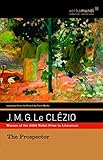This guest post comes to us from Daniel E. Pritchard. Daniel works in production, sales, and marketing for David R. Godine, Publisher, in Boston. He has now read The Prospector. He is also a co-founder of The Pen & Anvil Press, The Boston Poetry Union, and writes a regular blog on literature and culture called The Wooden Spoon.
“You peaked early,” my girlfriend says. It might be true, sad as that would be. Not to sound too Nick Hornby here, but a certain type of person runs into major achievements like this in their twenties and feels, immediately, that this is as good as it will ever get. I am that kind of person. The path of my career (and temperament) doesn’t seem to be pushing me towards major publishing companies, and Nobel Prizes are usually the playground for big boys. They were noticeably absent from this one, leaving all the fame and street-cred for small independents. It is fair to say that I – like my boss, David Godine – will go the length of my career and have this happen just once. This is that once. I am twenty-five.
 Let me emphasize that I had nothing to do with acquiring, editing, or producing The Prospector (link to more info on the publisher’s site), the J.M.G. Le Clézio novel brought out in 1993 – when I was twelve – by David R. Godine, Publisher. Of the many books that I had read on the Godine list, The Prospector was not among them. Nonetheless, on the morning we heard, I was absolutely beaming. I called my mother. I called my girlfriend. I called everyone. I gushed to the Falafel King at lunch. Of course, I’m aware that any pride I feel regarding Le Clézio’s Nobel Prize is purely by association: this is very much an Olympic games for literature. He’s one of ours, so we won. In a peculiar, not uncomplicated way.
Let me emphasize that I had nothing to do with acquiring, editing, or producing The Prospector (link to more info on the publisher’s site), the J.M.G. Le Clézio novel brought out in 1993 – when I was twelve – by David R. Godine, Publisher. Of the many books that I had read on the Godine list, The Prospector was not among them. Nonetheless, on the morning we heard, I was absolutely beaming. I called my mother. I called my girlfriend. I called everyone. I gushed to the Falafel King at lunch. Of course, I’m aware that any pride I feel regarding Le Clézio’s Nobel Prize is purely by association: this is very much an Olympic games for literature. He’s one of ours, so we won. In a peculiar, not uncomplicated way.
But in thinking about all this between frantic calls to printers and bookstores, there might be a more substantial sense of victory in this year’s Nobel. David Godine took a huge chance on an unknown (in the US) French author, on the basis of a recommendation by Gallimard’s rights manager – one book lover to another banking on a “no marketing” zone. He printed 6,000 copies of that first hardcover edition (“I must have been on drugs,” David told a Publishers Weekly reporter last week) because he thought it was a good book. The book was well-reviewed and sold well enough, and was the first in a list dedicated to works of literature appearing in English, in the US, for the first time, called “Verba Mundi.” It’s a good thing.
We had 420 copies in stock from that original printing of The Prospector, fifteen years ago, on Thursday, and were taking back orders by Friday morning: vindication by sales. Godine is one of four publishers in the US, I hear, to carry Le Clézio’s work, along with the University of Chicago, University of Nebraska, and another small trade press whose name escapes me [ed note: Curbstone Press]. It’s a banner moment for independent publishing. I can’t speak for the other houses, but at Godine, Le Clézio’s appearance in English is based entirely on the personal taste of David Godine, who still acquires our titles and who has picked up the work of important, unheralded authors such as Georges Perec and José Donoso since then.
For what it’s worth, I think that this year’s Nobel highlights a great and unfortunate weakness of American publishing. Not the charge that we don’t keep track of every author in every language in Europe, which is a Herculean task, perhaps impossible. Rather, that introducing and supporting the work of authors from around the world as part and parcel to being a publisher is an idea that seems to be fading. One expects not that all the work of Europe (and elsewhere, ahem) is published in English, but that American publishers get behind some author who, to their tastes, is great; is capital-G great. That they take a significant chance. Translation isn’t a nice thing you do if you can spare it, which is the way most publishers regard it; translation is essential. If evangelizing new, unheard-of authors isn’t integral to the reason a person goes into publishing, then why? It’s not for the fame, fortune, or the stylish tweed jackets. I have at least one of those, and I’m still pretty miserable.
You have to want this one moment, when you feel sure you’ve won something good for the culture, that you’ve introduced something new and important to the world. Even if it only lasts a day or an hour before, you know, reality sets in. Thursday morning. Three people in the office. The New Yorker is on the phone: tell us about this author.
Bonus Links: Le Clézio Wins the Nobel Prize for Literature, The Prizewinners: International Edition








